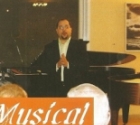-1366871458.jpg)
An article in the online magazine of the American Enterprise Institute in 2007 brought to light data about the so-called declining interest in opera.
At the time, there were 125 professional opera companies in the U.S., with 60 % of them having been launched since 1970. That was more than in Germany and twice as many as in Italy. Annual attendances at opera performances were 20 million, roughly the same as NFL football.
The spectacular growth occurred in small to medium sized enterprises. Regional opera companies, with fewer expenses than the world-class major opera houses, could charge lower fees and attract many more opera fans. Between 1982 and 2002, attendances grew by 46 %.
Yet, despite capacity houses, it is a common problem, not just in the U.S., but throughout the world wherever opera is performed, that general managers spend far more time fundraising and marketing than dealing with artistic matters.
Rudolf Bing, general manager of the Metropolitan Opera in New York from 1950 to 1972, once remarked: “The opera always loses money. That’s as it should be. Opera has no business making money.” Nothing seems to have changed.
So, from where does the money come? That varies, depending on which country. In Germany and other European countries massive state subsidies support opera. In the U.S. state funding represents no more than 5 % of the total yearly budget, a figure similar to the level of state funding in Israel. The balance of funding comprises door sales, sponsorship and donations.
It’s not hard to understand that when the economy takes a nose dive, the arts suffer accordingly. While near-full capacity houses are still being maintained, the level of donations and sponsorship is in sharp decline.
But there’s another matter which needs to be factored into the equation, the supply of singers. Educational institutions have recognized the opportunity and the need to train more opera singers, given the plethora of opera companies. However, the supply is far outstripping the demand. Opera singers are flooding the market. If professional opera singers, with proper care for their voices and a sensible booking schedule can maintain careers for anything up to 30 years, even longer in many cases, where are all the young hopefuls going to sing?
Presentation of live opera has changed considerably in the last 20 years. While nobody would dare to try to rewrite the music of Mozart or Verdi, productions have undertaken remarkable change. The introduction of surtitles has been highly successful, both for audiences and singers alike, especially as translating opera from the original language loses its authenticity, creating difficulties for singers. Imagine trying to sing Gilbert and Sullivan in Russian!
Modern costumery is another innovation. Purists are horrified, but younger audiences in particular appreciate that contemporary productions move opera from antiquity to modernity without any damage to the beauty of the music or the libretto.
What has clearly added to the financial burden of opera presentation is the cost of extravagant productions. Audiences expect to be entertained lavishly when they pay handsomely for tickets. They demand nothing but the best. Disgruntled opera singers often complain that directors and set designers have hijacked opera. Perhaps the fault is with the singers themselves. Mass production of young singers from music school doesn’t necessarily mean great careers are being built.
The primary objective of opera companies is to remain financially stable, not to promote the careers of ambitious young singers. While most companies these days support Young Artist Programs, major roles are more often than not allocated to big singing names, those that draw capacity audiences. Companies that lose sight of the ball can so readily fold. It’s a tough business.
So where do all the singers go after graduating? What opportunities present themselves for students who have spent three or four years studying, and at considerable expense?
It is worth going back in time to examine the teaching methods of German mezzo-soprano Mathilde Marchesi (1821-1913), one of the greatest singing teachers in the world. Included in her roster were some 40 singers of world class, with legendary names such as Australian soprano Dame Nellie Melba, French soprano Emma Calve, American soprano Emma Eames and Scottish-American soprano Mary Garden.
Marchesi claimed there were only two types of singing, good and bad. Beginners would start with lessons of 5 to 10 minutes 3 or 4 times a day. As the voice grew, as it matured and developed weight and color, the length of lessons increased. Her opinion was that it would take 12 years to train a voice capable of singing a major role in a great opera house like the Metropolitan in New York without doing damage to the vocal chords. Today, singers aren’t prepared to wait that long. They want to sing, and now.
Graduates straight out of music school only learn the basics of building a singing profession. Immediate advance to the glamor of the opera house is unrealistic. More specialized vocal training needs to be undertaken and every opportunity to perform minor roles in regional opera companies around the world should be accepted with open arms. Nobody should expect to walk out of opera school and be snapped up by an opera company. It’s even difficult to get an audition these days, in any country.
Promising young opera singers with the ambition to succeed and the will to work hard need not be discouraged by the prevailing conditions and the challenges that lie ahead. There are ways of breaking through.
No better lesson can be learned than from the career of dramatic soprano Astrid Varnay. Opera was a family business for the Hungarian-born Varnay family. Astrid’s father was an operatic tenor and her mother a coloratura soprano. They migrated to the U.S. when Astrid was 4. In 1940, at 22, she was invited to audition at the Metropolitan Opera. General Manager Edward Johnson simply could not believe she had memorized 13 major roles and spoke Hungarian, German, English, French and Italian. She had certainly arrived well prepared for the audition at America’s greatest opera house.
The payoff came one year later, on December 6, 1941, the day before Pearl Harbor. The Met had scheduled a matinee performance of Richard Wagner’s Die Walkure from the Ring Cycle. At the last minute, soprano Lotte Lehmann, who had the taxing role of Sieglinde, was indisposed, and Johnson called on Astrid Varnay to fill in, with no stage rehearsal whatsoever. It was a triumph and more was to follow. Six days later, Helen Traubel withdrew unexpectedly from singing Brunhilde in the same opera, an even more demanding and heavier role. Varnay once again stepped in to save the day. Astrid Varnay never looked back. She died at 88, after a highly distinguished career of 55 years.
.jpg)
Astrid Varnay: Stepped in to save the day
True, this is a remarkable story, but the lesson is clear. Young singers should prepare themselves for any out-of-the-blue opportunity which may arrive at a moment’s notice. To sit at home and wait for an opera company to call is a futile exercise. The call will never come.
Opera today is in big demand. Whether patrons prefer to see it live, recorded or electronically, its popularity is constantly growing. Some purists may deplore the exhibitionism of concerts like the Three Tenors and the association of Puccini with World Cup Football, but you are more likely to hear Nessun Dorma whistled in the street than at any time since the opera was first performed.
At the end of the day, despite the strong growth in demand, an oversupply of both performers and performing venues is creating a new operatic genre where life on the stage is being challenged by drama at the box office.
Lloyd Masel is a singing teacher and blogger: https://twitter.com/Falstaff88.
 ESRAmagazine Photo Contest: terms and conditions
ESRAmagazine Photo Contest: terms and conditions Advertisers List
Advertisers List-1366906022.jpg) Mayor at tree planting
Mayor at tree planting Art from the Heart
Art from the Heart Jewish Art Returns to Jerusalem
Jewish Art Returns to Jerusalem Musical Treats
Musical Treats Lloyd Masel
Lloyd Masel